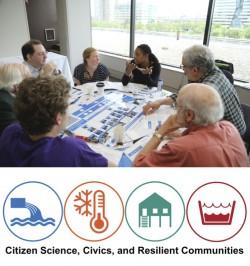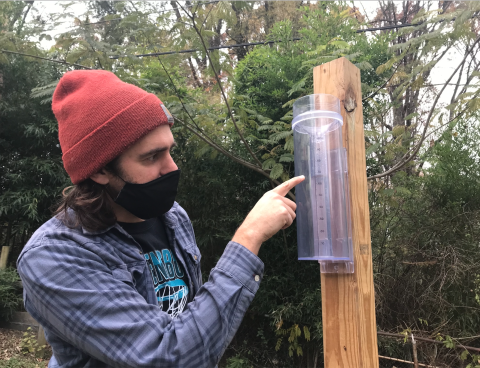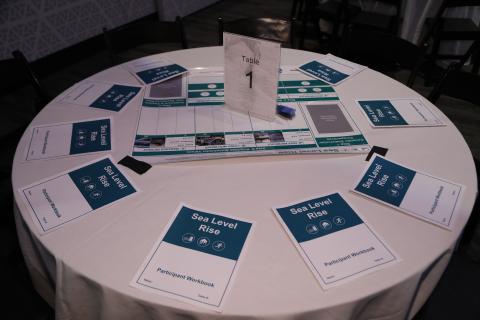
The NOAA funded Citizen Science, Civics, and Resilient Communities (CSCRC) project is pleased to make available one-time stipends to 20 recipients selected through a competitive application process . The purpose of the stipend is to support the implementation of the CSCRC project, which includes engaging public participants in active learning about climate hazards through citizen science, deliberative forums and resilience planning. This project is led by the Museum of Science, Boston (MOS) in partnership with SciStarter, Arizona State University (ASU), Northeastern University (NEU), and the National Informal STEM Education Network (NISE Network).
Building upon previous funding from NOAA in which a set of forum modules were created and used to engage participants in active learning and resilience planning about four natural hazards (extreme heat, sea level rise, extreme precipitation, and drought), the museum and its partners will add citizen science activities selected in close collaboration with resilience planners.
Check out the November blog post to learn more about the overall project and how the Museum of Science (Boston, MA) and Museum of Life and Science (Durham, NC) implemented this project at their museums.
Who Can Apply?
To be eligible to as a CSCRC site and receive a stipend, an institution must be:
- Informal science education institutions; such as science museums, science centers, natural history museums, children’s museums, zoos, nature centers, aquariums, botanical gardens, and public planetariums and observatories; or
- Academic and/or College or University outreach centers
- Located in the United States
Priority will be given to institutions that have prior experience in one or more of the following:
- Hosting deliberative forum programs
- Education programs about climate resilience topics
- Participating in citizen science activities
Please note that K-12 schools, afterschool programs, libraries, and locations outside of the United States are not eligible. Consider downloading digital materials if your organization does not meet eligibility criteria. Digital forum materials can be found on the forum archive and all citizen science projects can be viewed on SciStarter.org/NOAA.
What to Expect
If you are selected as a CSCRC site, you will work with your local community to foster knowledge, understanding, and data collection around climate resilience. This overall grant is focused on educating the public about 4 major climate hazards; extreme heat, extreme precipitation, drought, and sea level rise. Your site will pick one climate hazard to focus on that is important to your community and resilience planners. Along with educating participants about climate hazards through public forums, this project focuses on connecting citizen science projects to each hazard. This project is based on engaging people in a conversation on climate and creating community engagement around climate resilience.
Through this project you will work with resilience planners to select one climate hazard, choose a relevant citizen science project, recruit participants to participate in the citizen science project, and then invite citizen scientists and the general public to a deliberative climate hazard forum. We encourage sites to invite additional publics, scientists, resiliency planners to the forum, to not only continue learning but also learn more about citizen science. The project is designed to be a loop of engagement, anyone can join the loop at any point and continue to be engaged in climate resilience.
For more information about the stipend, expectations, forums, citizen science and more, please visit this extensive overview about the project.
What is Citizen Science?
Citizen science is the collection of scientific data by members of the general public. Citizen science allows the general public to participate in scientific research, while increasing their own knowledge of science. The term “citizen” is used in a broad, inclusive way, and does not imply any citizenship among participants.
For this project, it is encouraged to use an existing citizen science project. Below are some examples of projects to fit with the climate hazards. You can find a full list of all citizen science projects here: https://SciStarter.org/affiliates . Designing your own custom program from scratch is not expected or required, however you can do your own project if you have a local citizen science project in mind. Suggested citizen science projects: Drought - Globe Observer Land Cover; Sea Level Rise - MyCoast; Extreme Heat – ISeeChange; Extreme Precipitation - CoCoRaHS.

What is a Forum?
Forum programs engage participants in deliberative, inclusive conversations about issues that lie at the intersection of science and society. These programs allow Museum visitors, scientists, and policymakers to share their perspectives and learn from one another. The Museum of Science has developed and hosted over 100 Forum programs on a wide variety of topics, such as nanotechnology, deep space exploration, climate and energy policy, and synthetic biology.
This project uses the climate hazard resilience forums, which explore potential vulnerabilities to city infrastructures, social networks, and ecosystems from sea level rise, extreme precipitation, drought, and extreme heat, then discuss potential strategies for addressing these threats, focusing on the priorities and needs of relevant stakeholders. These forums are available for download for free, thanks to NOAA Grant NA15SEC0080005.

How to Apply - Application Deadline is January 15, 2021
NISE Network online workshop recording (12-1-2020) about the project
Overview: For applications instructions and eligibility, please carefully review the CSCRC 2021 Project Stipend Overview document available at:
Preview the application: The forum stipend application is an online process. Applications can be saved in the Qualtrics site, but we strongly suggest you write your responses in a Word doc, save, and then cut and paste that information into this application. You may download the application in a Word document format here:
Applications for a CSCRC project stipend application must be submitted online using Qualtrics by January 15, 2021:
Acknowledgements
This material was prepared using federal funds under award NA18SEC0080008 from NOAA. Any opinions, findings, and conclusions expressed in this material are those of the authors and do not necessarily reflect the views of NOAA or the US Department of Commerce.
